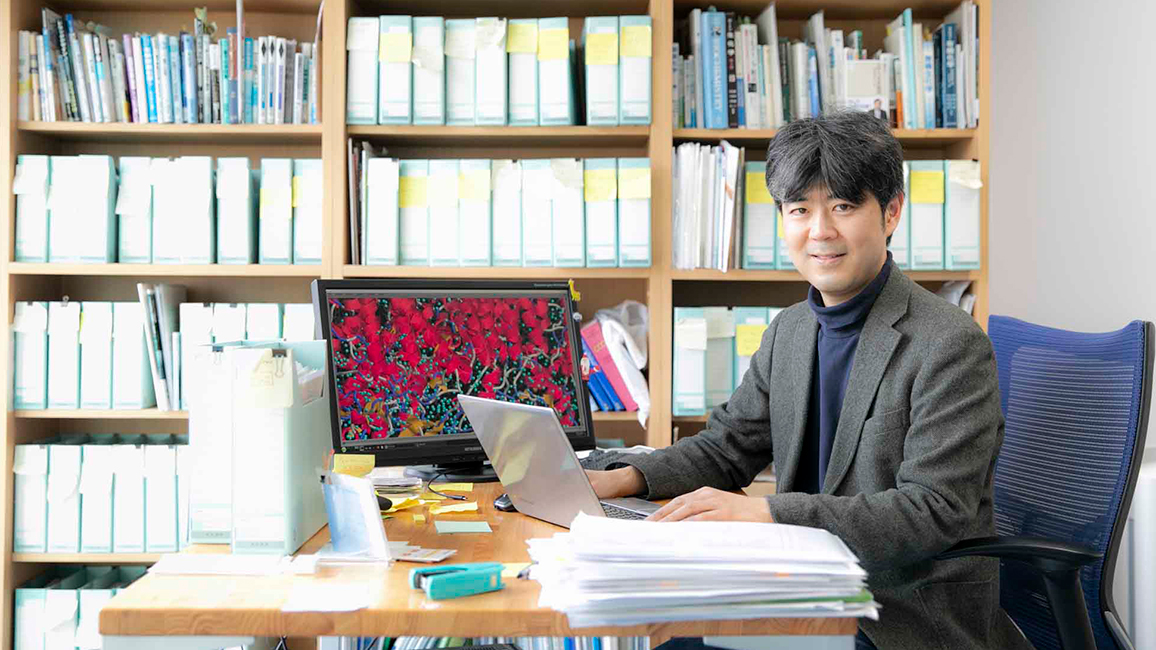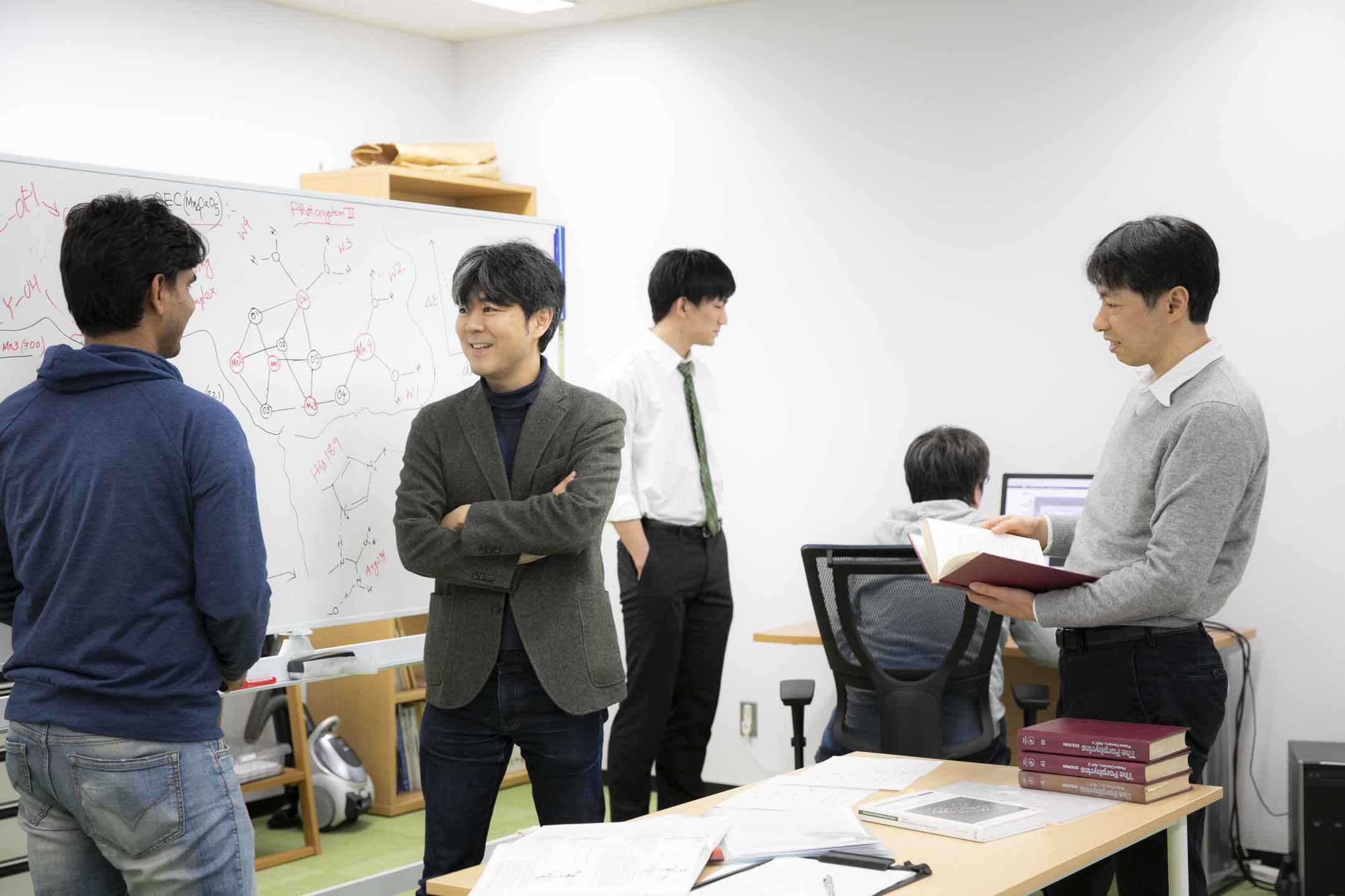- HOME
- Research at RCAST
- Visit to Laboratories
- Ishikita Laboratory
Ishikita Laboratory

Discovering the true structure of proteins using theoretical computation
Professor Hiroshi Ishikita’s laboratory is conducting research that uses theoretical computation to discover the functions of proteins based on their structures.
Their goal is to gain a deep understanding of the roles proteins play in life.
If DNA is life's blueprint, then proteins are the field teams that are responsible for the biological functions.
The mechanisms by which they do this are complicated, and it has not been possible to elucidate them through experiments – measuring the chemical properties of proteins – alone.
There are aspects of proteins that can only be discovered using theoretical computation.
Discovering functions based on protein's complex molecular structure – achievable thanks to theoretical computation
Proteins act in various ways in organisms, and they have apparently complicated three-dimensional structures. These are combined like precision machinery parts and are responsible for life functions.
The molecular structure of proteins can be determined using X-ray structural analysis, but merely looking at the structure is not enough to understand how it functions. This is why our lab uses computers to perform theoretical computation using experimentally determined on molecular structures. Through this research, we strive to discover the functions of proteins.
Though our lab has no reagents or beakers, we use theoretical approaches to elucidate protein dynamics and electron transfers, which are often hard to approach based on conventional experiments. The main focus of the lab is researching the functions of membrane proteins, which are responsible for photosynthetic reactions. Our research encompasses a range of other themes, as well, such as enzymatic activity, receptor activity, and molecular design for new materials.
The new world that opens up when you take up the tool of theory
When I started university, I wanted to study physics, but during my first two years of study at Junior division, the College of Arts and Science on the Komaba campus, I developed an interest in biology. I decided to do research on the borders of biology, physics, and chemistry, so I selected the Department of Chemistry & Biotechnology, School of Engineering at the admissions to senior division (Shin-Furi).
Up until the end of my master's cource, I was thoroughly absorbed in experiments, but for my doctoral degree I went to Germany to study theoretical chemistry. I had initially planned to seek employment after getting my master's degree, but after receiving an informal job offer, I looked back over my academic career and realized that now was my best chance to study abroad and get a doctoral degree. Though I had enjoyed experiments, I hadn't been very successful at it, so perhaps I felt as if I were leaving unfinished business.
When I took up the tool of theoretical chemistry, a whole new world opened up to me. Computation is straightforward. Things that I had thought to be commonsense before are often overturned by theoretical computation results. I am fascinated when conventional wisdom is overturned by computation, which is why I want to explore the mysteries of life that cannot be solved through experiments.
Where theory, experiments and knowledge from diverse fields intersect
One might assume that a theoretical computation lab attracts people who excel at mathematics and computers. However, our lab has many people with experimental research backgrounds, like myself. We have varied research fields, including biology, chemistry, and physics.
Computation is purely a means to the end of learning what we wish to know. Theoretical chemistry calculations require molecular structure data obtained through experiments. Knowing what part of this data to focus on, and what calculations to perform, requires experience with experiments and knowledge about biology and chemistry. Our lab does research on a wide range of proteins, including photosynthetic proteins. Students select their research themes based on their own interests.
The fundamental motivation of our research is basic science -- discovering universal principles of life through the study of proteins. However, studying the mechanisms of photosynthesis can contribute to artificial photosynthesis, and we also conduct research with an eye to potential applications, such as drug and material development. Graduates of our lab go on to various careers, such as working for chemicals manufacturers, energy companies, and government ministries.
The Research Center for Advanced Science and Technology, where I am a faculty member, brings together researchers from diverse fields. It has not only science labs but also social science labs. Their approaches vary as well, from basic research to engineering applications. Interchange with researchers from other fields is stimulating, and new perspectives produce new insights. Let’s work to solve the mysteries of life thorough proteins by using the tool of theoretical computation in this multidisciplinary environment.





